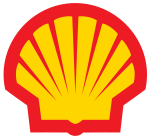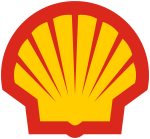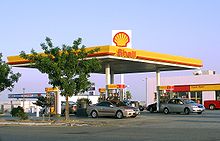
世界百大品牌 – Rank no.73 – US
Top 100 Brand in The World – Rank no.73 – Shell – US
 |
|
| Industry | Oil, energy |
|---|---|
| Headquarters | Houston, Texas, US |
| Key people | Marvin E. Odum, President |
| Revenue | |
| Employees | 24,008 (2008) |
| Parent | Royal Dutch Shell |
| Website | Shell USA Official website |
Shell Oil Company is the United States-based subsidiary of Royal Dutch Shell, a multinational oil company (“oil major“) of Anglo–Dutch origins, which is amongst the largest oil companies in the world. Approximately 22,000 Shell employees are based in the U.S. The U.S. head office is in Houston, Texas. Shell Oil Company, including its consolidated companies and its share in equity companies, is one of America’s largest oil and natural gas producers, natural gas marketers, gasoline marketers and petrochemical manufacturers.
Shell is the market leader through approximately 25,000 Shell-branded gas stations in the US which also serve as Shell’s most visible public presence. Shell Oil Company is a 50/50 partner with the Saudi Arabian government-owned oil company Saudi Aramco in Motiva Enterprises, a refining and marketing joint venture which owns and operates three oil refineries on the Gulf Coast of the United States.

A Shell gas station near Lost Hills, California
Shell products include oils, fuels, and card services as well as exploration, production, and refining of petroleum products.[1] The Shell Oil Refinery in Martinez, California, the first Shell refinery in the United States,[2] supplies Shell and Texaco stations in the West and Midwest.[3]
Shell gasolines previously included the RU2000 and SU2000 lines (later there was a SU2000E) but they have been superseded by theV-Power line.[4]
In 1997, Shell and Texaco entered into two refining/marketing joint ventures. One combined their midwestern and western operations and was known as Equilon. The other, known as Motiva, combined the eastern and gulf coast operations of Shell Oil and Star Enterprise, itself a joint venture between Saudi Aramco and Texaco.[5] After Texaco merged with Chevron in 2001, Shell purchased Texaco’s shares in the joint ventures.[6] In 2002, Shell began converting these Texaco stations to the Shell brand, a process that was to be completed by June 2004 and was called “the largest retail re-branding initiative in American business history.
Relationship with Royal Dutch Shell[edit]
Until the mid-1980s Shell’s business in the United States was substantially independent, with its stock (“Shell Oil”) traded on the NYSEand with little direct involvement from the Group’s central office in The Hague, Netherlands. In 1984, Dutch Royal Shell made a bid to purchase those shares of Shell Oil Company it did not own (around 30%) and despite some opposition from some minority shareholders which led to a court case, Shell succeeded in the buy-out for a sum of $5.7 billion.[8] Despite the acquisition, however, Shell Oil remained a very independent business. This was partly for complex legal reasons as RoyalDutch/Shell feared that there could be onerous liabilityproblems if a closer control of Shell Oil’s affairs was taken by the “parent companies”. One of the consequences of this independence was that the Shell logo used in the US was slightly different from that used in the rest of the world. In the 1990s Shell Oil’s independence began gradually to be eroded as the “parent companies” took a more hands-on approach in the running of the business. The logo used in the United States is the same as that used elsewhere since June 1, 1998.[9]
Subsidiaries[edit]
- Aera Energy LLC is a joint venture with Mobil Oil operating in California.
- Shell Development Emeryville was a research facility that operated from 1928–1966 in California
- Motiva Enterprises is a joint venture with Shell and Saudi Refining.
Legal issues[edit]
Environmental[edit]

Storage tanks and towers at Shell Puget Sound Refinery, Anacortes, Washington
The U.S. Environmental Protection Agency (EPA) issued a Notice of Violation to Shell Oil Company for its infringements of the Clean Air Act at a bulk petroleum terminal the company owned in Bridgeport, Connecticut, prior to October 1, 1998. According to the report, Shell loaded a total of 28.4 million gallons of gasoline onto barges without required vapor recovery equipment on seven days in 1997 resulting in 56 tons of uncontrolled volatile organic compound emissions. During the investigation, the EPA found that Shell built an additional loading bay in 1995 without permits from the state Department of Environmental Protection. Bridgeport’s facility had been recorded to produce an average of about 170 tons of volatile organic compounds per year.[10] This modification has the potential to produce 30 tons more per year more of the polluting emissions.[11]
Shell Puget Sound Refinery, Anacortes, Washington, was fined $291,000 from 2006 to 2010 for violations of the Clean Air Act making it the second most-fined violator in the Pacific Northwest. As of 2011, it was listed as “high priority violator” since 2008.[12][13]
In 2008, a lawsuit was filed against Shell Oil Company for alleged Clean Air Act violation. Shell Deer Park facility, 20 miles east of Houston, was the nation’s eighth-largest oil refinery and one of the world’s largest petrochemical producers. The facility was also the second largest source of air pollution in Harris County, which ranked among the lowest in the nation in several measures of air quality.[News 1] According to Sierra Club and Environment Texas, analysis of Shell’s reports to the Texas Commission on Environmental Quality, air pollutants released at Deer Park since 2003 exceeded the EPA’s emissions limits.[14]
Shell, working with Philips, implemented efforts to reduce the impact of its operations on the millions of migratory birds that encounter the North Sea drilling operations.[15][16]
Zone-pricing[edit]
Mehdi Shahbazi was a Shell station operator in central California who posted signs in 2005 stating “Big oil’s unearned profit” in protest ofzone pricing. Shell sued Shahbazi saying that the protest violated the terms of his lease.[17] Shahbazi responded by accusing the company of “breach of contract and of violating the Petroleum Marketing Practices Act”. Shell then terminated his contract. A federal judge ruled in favor of Shell and Shahbazi was ordered to vacate the station.[18]
Shahbazi died on November 14, 2007, due to liver failure which was a result of a hunger strike.[18]
Corrib Gas Controversy[edit]
The Corrib gas project entails the extraction of a natural gas deposit off the northwest coast of Ireland. The project includes a development of the Corrib gas field, and constructions of the natural gas pipeline and a gas processing plant. The project is developed by Shell E&P Ireland as operator of the project, in cooperation with Statoil Exploration (Ireland) Limited, and the Vermilion Energy Trust.[19][20]
Controversy arrose when planning permission for a pipeline through Broadhaven and Sruth Fada Conn Bay in Kilcommon parish, County Mayo, was granted by the Mayo County Council despite objections from local residents.[21] Shell threatened the residents with court orders if they did not grant the company permission to build through their land.[22] The issue rose to national prominence on the 29th of June 2005 when five protestors, known as the Rossport Five, were imprisoned by local police officers at Shell’s request for interfering with Shell employees carrying out work on the local residents’ land.[23] The men were released from Cloverhill Prison on 30 September 2005, after 94 days, when Shell applied to the High Court to have the injunction lifted. This came after intense media and political scrutiny of the case.[24]
Polybutylene lawsuit[edit]
From 1978 to 1995, Shell Oil produced polybutylene pipes, which corrode when exposed to chlorine. A class action lawsuit was filed in 1995 against Shell Oil when the polybutylene pipes caused flooding in many households in the US and Canada.[25] The settlement required Shell Oil to pay for the re-installation of piping for millions of houses for claims filed through May 2009.[26]
Nigerian settlement[edit]
In June 2009 Shell’s parent company, Royal Dutch Shell, paid US$15.5 million to settle a lawsuit brought in U.S. District Court in New York. The suit alleged that Shell had conspired with the government of military dictator Sani Abacha to kill author Ken Saro-Wiwa and other Ogoni citizens involved in a nonviolent campaign against oil waste dumping in their homeland in the Niger Delta.[27] More than 50 years of unsafe drilling and frequent oil spills and gas flarings in the region have had a disastrous effect on the environment and on human health.[28] Nigerian troops used violence to suppress protests, while Shell resisted pressure to use its influence to improve the situation.[29]
Saro-Wiwa had been president of the Movement for the Survival of the Ogoni People when he and eight others were arrested, brought before a military tribunal, and sentenced to be hanged. After the executions in November 1995, Saro-Wiwa’s body was “burned with acid and thrown in an unmarked grave.”[29]
The incident focused widespread outrage on Royal Dutch Shell and the Nigerian government. In New York the Center for Constitutional Rights brought suit against the company on the grounds that surviving plaintiffs could not safely return to Nigeria to press their claims there.[29] The US$15.5 million settlement paid for legal fees, compensation to Ogoni families, and “a trust to invest in social programs” in Nigeria.[27] Shell did not admit wrongdoing, but claimed the settlement was made on “humanitarian” grounds. Ben Amunwa, director of the Remember Ken Saro-Wiwa organization, replied that Shell settled the case “because the evidence compiled by the plaintiffs, was damning enough to force an out of court settlement.”[30]
In 2012[dated info] the US Supreme Court was scheduled to hear arguments in a similar case filed by Esther Kiobel, widow of an anti-Shell activist, to determine whether her case against Royal Dutch Shell may proceed through the US court system.

